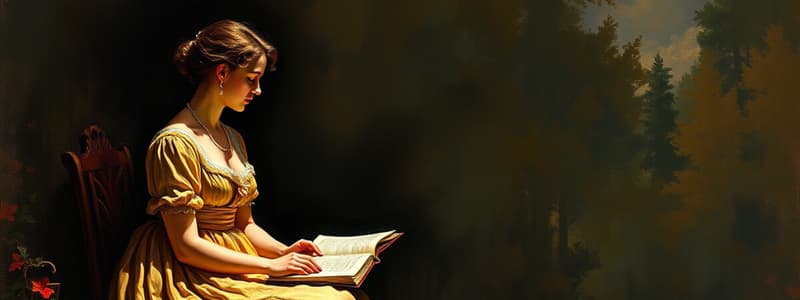Podcast
Questions and Answers
What does the word drama originate from?
What does the word drama originate from?
- A term for televised performances
- A Latin word meaning 'to act'
- A Greek word meaning 'to do' (correct)
- An English term for plays
Which of the following best describes imagery in literature?
Which of the following best describes imagery in literature?
- Concrete representations that evoke sensory experiences (correct)
- The arrangement of words in a sentence
- A direct comparison using 'like' or 'as'
- A rhythmic pattern in a poem
What is the main function of rhyme in poetry?
What is the main function of rhyme in poetry?
- To signify the meaning of words
- To create a visual representation of emotions
- To establish a pattern of end sounds (correct)
- To substitute one idea for another
How is rhythm characterized in poetry?
How is rhythm characterized in poetry?
Which element of tone is NOT associated with conveying the speaker's attitude?
Which element of tone is NOT associated with conveying the speaker's attitude?
What term is used for a strong pause within a line of poetry?
What term is used for a strong pause within a line of poetry?
Which type of metaphor involves substitution based on association?
Which type of metaphor involves substitution based on association?
What defines a stanza in poetry?
What defines a stanza in poetry?
What was a significant feature of Middle English Literature?
What was a significant feature of Middle English Literature?
Which characteristic describes the concept of 'Courtly Love' during the Middle Ages?
Which characteristic describes the concept of 'Courtly Love' during the Middle Ages?
What was a primary focus of writings during the Middle English period?
What was a primary focus of writings during the Middle English period?
Which literary form was prominently rediscovered during the Renaissance?
Which literary form was prominently rediscovered during the Renaissance?
What is a defining characteristic of the romance genre in Middle English literature?
What is a defining characteristic of the romance genre in Middle English literature?
What led to the oral quality of literature during the Middle Ages?
What led to the oral quality of literature during the Middle Ages?
Why was originality not a significant requirement in Middle English literature?
Why was originality not a significant requirement in Middle English literature?
What significant transformation did the English language undergo during the Middle English period?
What significant transformation did the English language undergo during the Middle English period?
Flashcards are hidden until you start studying
Study Notes
Techniques for Reading Drama
- Originates from the Greek word "Dran," meaning "to do" or "to act."
- Drama emphasizes action and performance, distinguishing it from prose and poetry.
What is Drama?
- Defined by Alfred Hitchcock as "life with the dull bits cut," highlighting its focus on engaging moments.
Literary Terms
- Metaphor: Direct comparison between dissimilar entities without using "like" or "as." Example: "My love is a red, red rose."
- Synecdoche: A part of something represents the whole, e.g., referring to gossip as a "wagging tongue."
- Metonymy: A related concept substitutes for the subject, e.g., "silver screen" for movies.
Imagery
- Concrete representation that evokes sensory experiences, can be visual, aural, tactile, olfactory, or gustatory.
- Involves patterns of related details to create a cohesive experience.
Rhyme
- Repetition of similar sounds at line ends, focusing on phonetics rather than spelling.
- Rhyme schemes are identified by using letters (e.g., 'a' for the first sound, 'b' for the second).
Rhythm
- Refers to stressed and unstressed sounds in poetry, crucial for expressing meaning and emotion.
- Caesura: A significant pause within a line enhancing its rhythm.
- End-stopped line: A line with a pause at its end, marked by punctuation.
- Run-on line/Enjambment: A line that continues into the next without a pause.
Stanza
- A group of lines typically adhering to a specific meter and rhyme pattern, creating structure in poetry.
Tone
- Reflects the speaker's attitude towards the poem’s subject, inferred from language details.
- Influenced by the choice of meter, rhyme, imagery, diction, and syntax, contributing to the poem's overall feeling.
Global Literature Context
- Encompasses the totality of national literatures worldwide.
- Involves the dissemination of literary works beyond their country of origin.
Old English Literature (450-1150)
- Marked by three significant conquests leading to:
- Diverse letters and grammar structures.
- Variations in spelling conventions.
- Notable work: "The Song of Beowulf".
Middle English Literature (1150-1500)
- The English language evolved to maturity, notably influenced by Chaucer's poetry.
- Features of this period:
- Anonymity: Unknown authors, exemplified by "Beowulf".
- Originality: Common material viewed as shared property; translations were esteemed as original works.
- Religious influence: Literature often reflected the societal focus on salvation and the fear of hell.
- Oral tradition: Most people engaged with stories through listening due to the absence of printing technology.
- Courtly Love: A romantic code defining relationships among the aristocracy, requiring knights to prove their worthiness through heroic acts.
- Chivalry: A code of conduct defining the ideals and responsibilities of knighthood.
- Romance narratives: Popular stories focusing on loyalty, courtly love, and knightly heroism, composed in prose or verse.
The Renaissance (1500-1650)
- A revival of classical works and ideas.
- Emergence of poetic forms such as:
- Sonnet.
- Elegy.
- Pastoral.
Studying That Suits You
Use AI to generate personalized quizzes and flashcards to suit your learning preferences.




